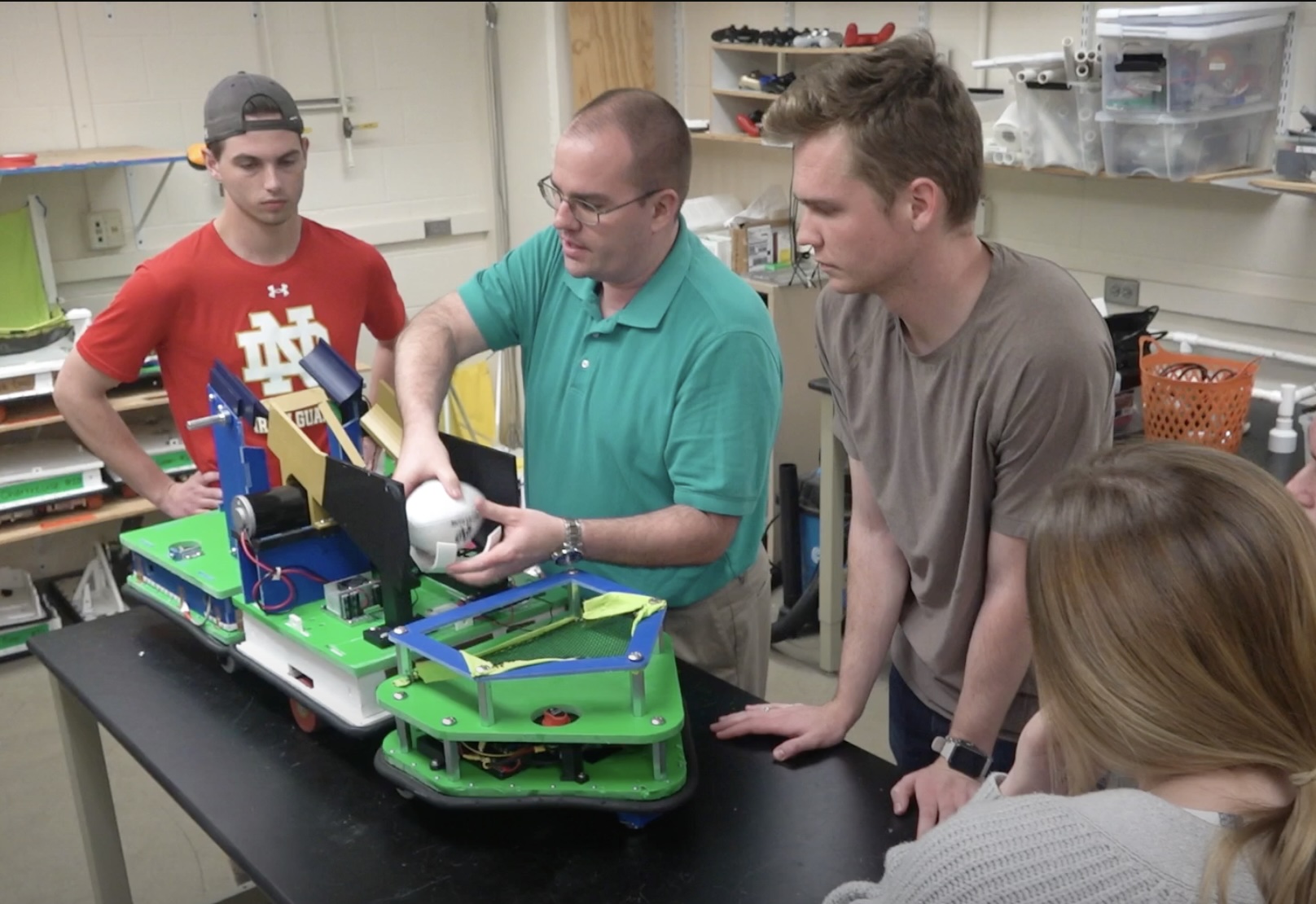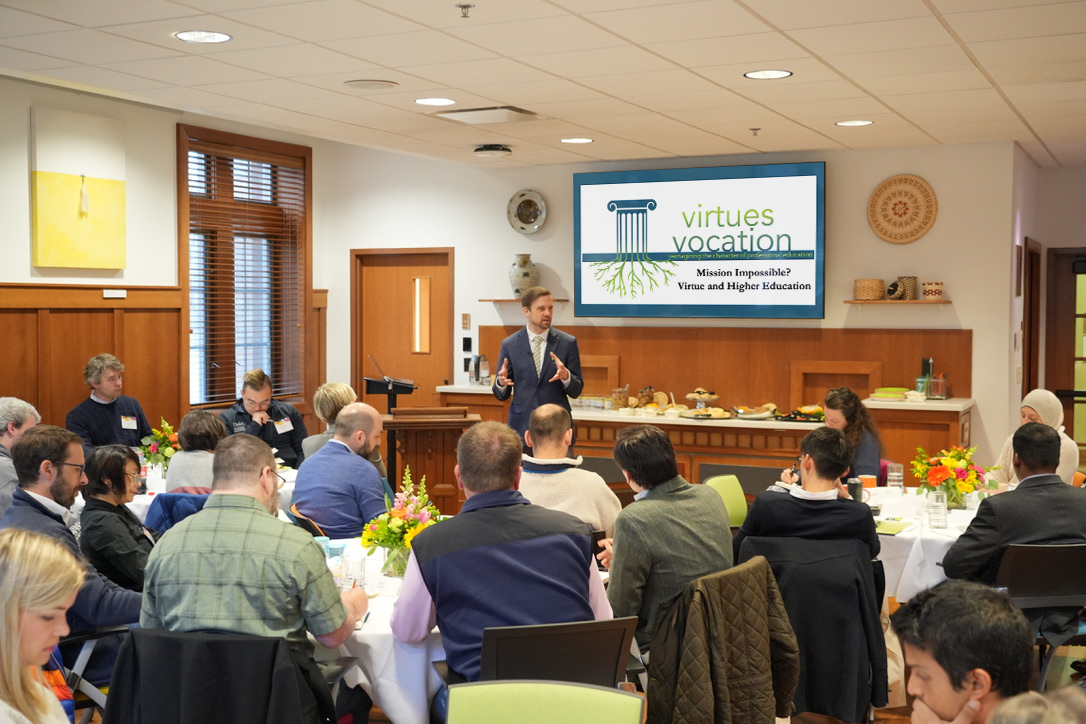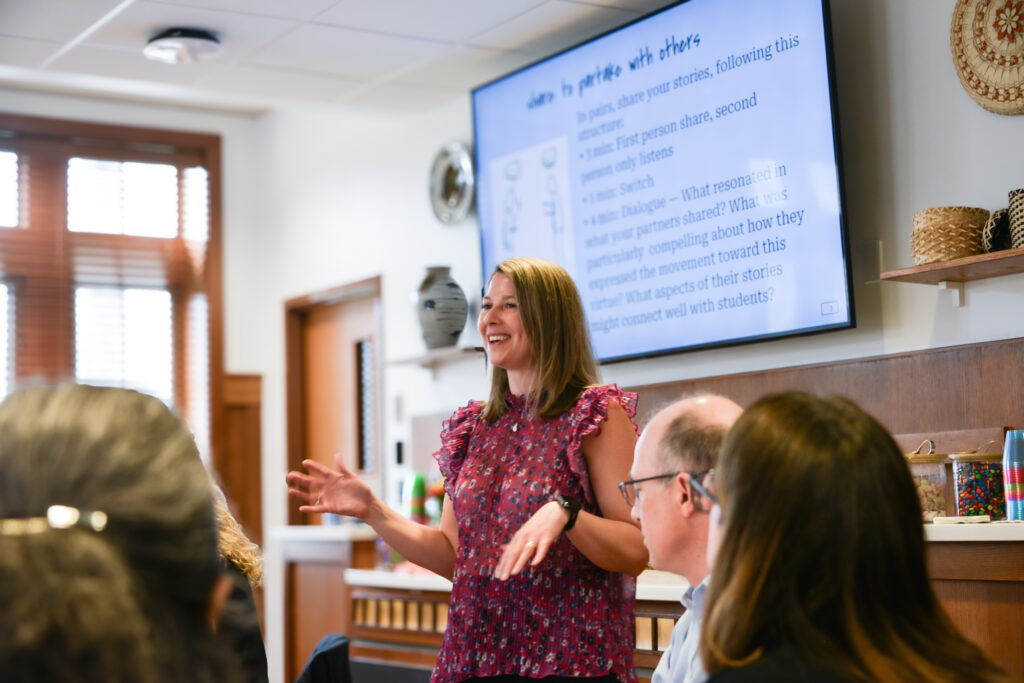Engineering for good
January 13, 2025
When Craig Goehler’s first-year engineering students walk into their first engineering design course and pick up a syllabus, they probably expect problem sets and design assignments. So they are likely surprised to see words like “empathy, honesty, and justice” in the weekly learning outcomes alongside those assignments. But for Goehler, an associate teaching professor in the Department of Aerospace and Mechanical Engineering, it is important to be explicit about the way virtues are embedded in the engineering design process; in fact, Goehler has come to believe that virtue is fundamental to becoming a good engineer.

“I have always cared about educating the whole person when interacting with my students,” said Goehler. “But I’ve especially appreciated how the Integrating Virtue Together program at the Institute of Social Concerns and the College of Engineering Virtues Working Group have given me the opportunity to not only reflect on how to care for my students but also to improve the ways I prepare them for their chosen professions.”
The College of Engineering and Institute for Social Concerns first partnered in 2022 when they co-hosted the Virtues & Vocations Engineering Education Workshop, bringing together deans and faculty from more than 12 engineering schools such as Duke, the University of Michigan, Purdue, Olin College of Engineering, and Georgia Tech. Virtues & Vocations is a national forum hosted at the Institute for Social Concerns (SOCO) that brings together scholars and practitioners to consider how best to cultivate character in pre-professional and professional education. The forum is part of SOCO’s broader commitment to justice education and research for the common good.
“At the Institute for Social Concerns we know that a just society depends on people who are committed to justice working in the many professions that make a society—engineers, lawyers, doctors, teachers,” said Suzanne Shanahan, Leo and Arlene Hawk Executive Director of the Institute for Social Concerns. “We move toward justice in the actual work we do. If we want our students to develop a commitment to justice and the common good, we must be committed to cultivating the virtues and practical wisdom necessary to inform and sustain that work. The virtues are not merely personal commitments, but foundational to professional identity and purpose.”
The connection of virtue to professional identity is also something that David Go, Viola D. Hank Professor of Aerospace and Mechanical Engineering and Vice President and Associate Provost of Academic Strategy, says is fundamental to how he understands his role as an engineer and educator. As an early advocate for virtues in engineering, he worked with Shanahan and SOCO to develop a working group in the College of Engineering to pursue a capacious vision of engineering for the common good, one that would deepen aspirations of justice and purpose expressed by engineering faculty and students alike.
“What we do in the engineering or science classroom is a part of the larger project of student character formation happening in residence halls and co-curricular spaces,” Go said. “Our job is not just to teach students fluid mechanics, it’s to teach fluid mechanics while we contribute to their character formation.”
In the early stages of this project, Megan Levis-Scheirer was tapped to help lead the virtues and engineering working group. Levis-Scheirer is an assistant professor at the Institute for Social Concerns and the College of Engineering and co-author (with Walter Scheirer and Louisa Conwill) of Virtue in Virtual Spaces: Catholic Social Teaching and Technology.
“One of the clear indications of change among faculty in the working group is that we learned to call attention to the virtues students demonstrate as they study and practice engineering,” she said. “For example, your capacity to be a good listener can make you a better engineer. As a good listener, you’ll have a better understanding of a problem you’re being faced with. And this builds resilience too. It gives students different ways to participate in the field, to bring their expertise to engineering. Having this expanded view of engineering helps us and our students see the diversity of the skills needed to be an engineer.”

Alongside the engineering working group, some engineering faculty attended the Integrating Virtue Together (IVT) national workshop hosted by the Institute for Social Concerns each spring. IVT is a signature program of Virtues & Vocations and brings together faculty from across institutions and disciplines to join a community of practice in integrating virtues into a course they will teach. Through this initiative, engineering faculty at Notre Dame engaged in cross-professional collaborations to integrate virtue into their syllabi and pedagogy.
As a member of IVT and an ongoing participant in the working group, Goehler revised his syllabus and learned alongside engineering, law, business, and science faculty from across North America. As a “firm believer that in order to be a good engineer, you need to be a good person,” Goehler rejoiced in the opportunity to join a national community of practice dedicated to developing virtue in the professions.
Faculty in the engineering working group, with the support of the IVT framework, have revised almost a dozen courses in the College of Engineering to be explicit about developing character through engineering. Building on this momentum, SOCO and the Provost’s Office are hoping to reach even more Notre Dame faculty with a new initiative, Learning Becomes Service: Expanding Character Education Programs at the University of Notre Dame, supported by a grant from the Educating Character Initiative at Wake Forest University. Learning Becomes Service will harness the Integrating Virtues Together model and insights from the engineering working group to integrate character into the preprofessional programs in the School of Architecture, the College of Science and the Mendoza College of Business.
“In this new effort, we are excited to work with faculty within each school to discern which elements of character are fundamental within each profession and how best to cultivate them given the broader objectives of each discipline,” said Levis-Scheirer. “After all, what it means to be a good electrical engineer and what it means to be a good accountant are different, and what the School of Architecture is trying to achieve in a required design seminar is not the same as what the College of Engineering is trying to achieve in their required design seminar.”
Though the cultivation of character across the professional schools needs to reflect this significant variation, initiative leaders are resolute in the belief that Notre Dame has an obligation to educate a generation of professional leaders of character, who possess both good technical skills and good character, which empower their commitment to serving the common good.
“Faculty and students alike are yearning for a transformative curriculum that prepares students to be both adept professionals and well-formed persons of character in the working world,” said Shanahan. “Such a transformation promises to mold the next generation of students entering these professions. And in doing so, they offer transformative possibilities for professions themselves.”
In March, the IVT program convened 37 faculty from colleges and universities across the country, including Duke, the University of Virginia, University of the South, Furman, Baylor, Belmont, Vanderbilt, Texas A&M, and Rice. Of the 37 attendees, 12 were from Notre Dame.

“We wanted to work on creating a clear learning arc, one that invited the participants to consider how to integrate the deep tradition of virtue ethics into their syllabus and into their teaching practice,” said Samantha Deane, senior research associate on the Virtues & Vocations project at SOCO. “So we learned about the tradition of virtue ethics and recent innovations in character education, but we also opened our syllabus, studied its parts, and reflected on our teaching habits” She added, “This was our biggest IVT cohort yet, and by all measures, it was the most successful.”
“Everything—and I mean everything—was perfect,” Doug Orzolek, professor of music at the University of St. Thomas in Saint Paul, Minnesota, wrote following the gathering. “We were truly made to feel like we were a part of the Notre Dame family from the moment we arrived. As a college professor and administrator, I know that these sorts of things do not happen by accident. They are the result of wonderful leadership and many people behind the scenes. I could not imagine a better experience.”
SOCO will be hosting another group of 30 IVT participants in May, before and after the Virtues & Vocations conference.
Story updated April 3, 2025.
Related Stories
-
Photo story: McNeill Winter Plunge
-
Tattoos on the body and the heart—Graduate Justice Fellow Joachim Ozonze pursues vocation of healing justice
-
Walking the walk of reentry—Reentry simulation challenges students to confront the reality of life after incarceration
-
ReSearching for the Common Good: Giulia Gliozzi
-
Doing justice, delivering change—Institute launches interdisciplinary minor





